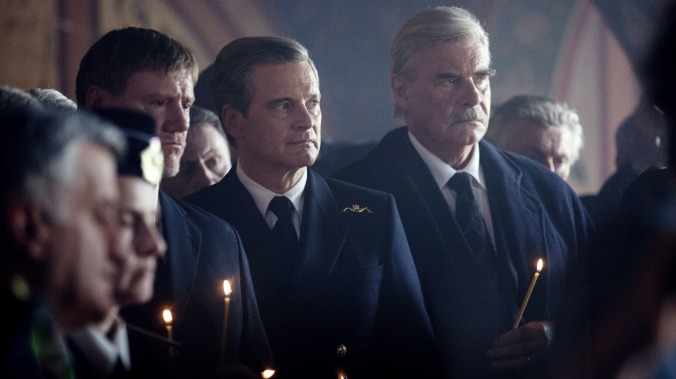The Command sucks all of the dramatic oxygen out of a real-life submarine disaster

Some real-life disasters are more easily dramatized than others. From the moment that it sank, the RMS Titanic inspired motion-picture treatments: The first of them, a now-lost short called “Saved From The Titanic” (starring an actual survivor!), was released less than a month afterward. Note the key word there, however: “Saved.” By grim contrast to the hundreds who were pulled from the wreckage of the Titanic, nobody emerged alive from the Russian nuclear-powered submarine Kursk, which sank during a naval exercise on August 12, 2000. Indeed, Robert Moore’s nonfiction account, from which The Command was adapted, is bluntly titled A Time To Die. That book chronicles the administrative inaction that doomed 23 sailors who survived the initial explosion, and men waiting to run out of air while their government does nothing makes for a whole lot of stasis—a problem that director Thomas Vinterberg (The Celebration) and screenwriter Robert Rodat (Saving Private Ryan) never really crack.
It doesn’t help that The Command looks phony right from the outset, being an English-language film involving virtually no actual Russians. (This multi-national approach, once commonplace, now seems all but archaic.) Most of the sailors come across as anonymous, with one of the more memorable played by Matthias Schoenaerts; he gets one memorably tense sequence that requires his character to swim through freezing water into a fully submerged compartment and find some oxygen cartridges that’ll sustain the remaining crew for a few more hours. Even then, it’s hard to root for him to make it when you know that he’s going to die soon anyway. Meanwhile, on land, our primary hero’s wife (Léa Seydoux) does the usual fretting and demanding to know what’s being done, receiving only stony silence by way of reply. Meanwhile, the Russian admiral in charge of the rescue mission (Peter Simonischek, best known for his role in Toni Erdmann) complains about the substandard equipment at his disposal, and a British naval officer (Colin Firth) makes repeated offers to provide assistance, only to be rebuffed again and again by suspicious Russian authorities.
Chief among said authorities in real life was Vladimir Putin, who’d been elected Russia’s president just a few months earlier. Putin was reportedly a significant supporting character in Rodat’s original script, but he doesn’t appear at all in the completed film, which instead blames the country’s sluggish response on generic suits who are overly concerned with protecting military tech. Such a notable absence only serves to make The Command seem that much less authentic. Ultimately, though, the film founders simply because it’s dangerously low on dramatic fuel. Vinterberg struggles to keep things exciting, even pointlessly shifting the aspect ratio (early scenes are boxier, with the frame widening when Kursk takes to the sea), but mostly winds up trading in clichés—this is the kind of movie in which we get a close-up of a little boy watching the sub depart with a sorrowful expression, as if experiencing a premonition that he’ll never see his father again. It’s the same expression that most viewers will wear throughout. There’s not much to do except wait for the helpless people onscreen to die. It’s The Perfect Storm minus the storm.